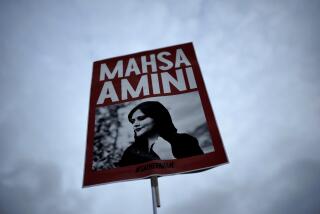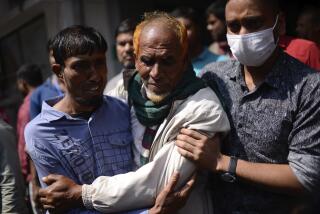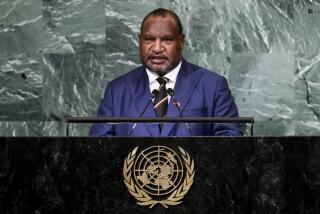New rioting in Bangladesh pushes death toll to 37
NEW DELHI -- Police and demonstrators in Bangladesh clashed for a second day Friday as the death toll rose to at least 37 in violence sparked by a controversial death sentence handed down against the head of an Islamic party for war crimes committed during the country’s 1971 war of independence.
Local media reported that two people were killed in the rioting Friday, adding to 35 or more deaths after the sentencing of Delwar Hossain Sayedee, a senior leader in Bangladesh’s largest Islamic party, Jamaat-e-Islami.
At least four of the dead were reportedly law enforcement officials. Hundreds more were injured.
Jamaat called for stepped-up protests after Friday prayers. In response, the government deployed thousands of police and paramilitary units around the capital of Dhaka, especially near major mosques. About 90% of Bangladesh’s 150 million people are Muslim.
“The government took a lot of security precautions,” said Bobby Hajjaj, a Dhaka-based business consultant and lecturer. “So far it looks like they’ve successfully beaten down the religious card.”
[Updated 11:55 a.m. March 1: Though the war ended four decades ago, many of the rifts in that seminal conflict, including those between Islamists and secularists, have never been resolved. The government has promoted war crimes tribunals as a way to jettison historical baggage and unify society. However, groups such as Jamaat, which opposed independence, see the trials as a threat.]
The militant, well-organized Jamaat planned the unrest for weeks in hopes of pressuring the government into ending war crimes tribunal proceedings, said S. Chandrasekharan, the New Delhi-based director of the South Asia Analysis Group, a think tank.
But the legal proceedings will almost certainly continue given that they were a campaign promise by the government, he added. “It’s a highly polarized society,” he said. “Violence will continue.”
Jamaat has called for a nationwide general strike Sunday and Monday.
Television images showed protesters chasing police, destroying furniture, ripping down political banners and burning vehicles. Other coverage showed police beating a man in black trousers and a light pink shirt.
Tensions have been running high in recent weeks as verdicts were announced in the trials linked to the 1971 war that ended Pakistan’s control over Bangladesh, previously known as East Pakistan. About 53 people have died since the first verdict on Jan. 21.
Mirza Fakhrul Islam, a spokesman for the opposition Bangladesh Nationalist Party, accused security forces of deliberately killing protesters in recent days. The party has called for a nationwide protest strike Tuesday. “It was another form of mass killings,” he told reporters. “We must stand up against such brutalities.”
Official figures suggest that 3 million people were killed and 200,000 women raped by Pakistani troops and their local supporters during the conflict, although many independent analysts say those figures are inflated.
In an article shortly after the war, National Geographic magazine said the killing was so extensive that vultures were “almost too fat to fly.”
The tribunals have polarized Bangladesh, with mainly middle-class, secularist protesters taking to the street to celebrate the verdicts, met by Jamaat supporters infuriated over the sentences, which they say are politically motivated. Jamaat opposed independence in 1971 but denies its members were involved in war crimes.
Over the past three years, a total of eight Jamaat leaders and two Bangladesh Nationalist Party members have come before the tribunals.
Human rights groups have questioned the tribunals’ methodology, however -- including a decision not to probe the November disappearance of a defense witness outside the courthouse gates -- arguing that it doesn’t meet international standards. The government has countered that the tribunals are unbiased, independent and an important step in redressing past injustice.
Since Sayedee’s sentence Thursday on eight counts of committing mass killings, rape and violence, his backers have attacked government offices, torched the houses of officials and torn up railway tracks.
Supporters say that Sayedee, now 73 and a firebrand preacher, was a modest Islamic seminary teacher at the time and couldn’t possibly have been involved in such wanton acts.
Prosecutor Syed Haider Ali said Thursday’s verdict was fair. “Justice has been done to those who lost their loved ones at the hands of Sayedee,” he said.
Extra security has also been placed around Hindu neighborhoods after homes and temples were attacked by Islamists in southern parts of the country, killing one elderly Hindu man, police said.
Secular Bangladeshis were stunned by the Feb. 15 murder of blogger and online activist Ahmed Rajib Haider Shovon, allegedly stabbed outside his house by Jamaat supporters. Three men have since been detained.
Tens of thousands of protesters have repeatedly filled Dhaka’s central Shahbagh Square protesting Rajib’s death and calling for tough sentences.
“We are very shocked, but not at all surprised,” said Sultana Kamal, a lawyer and head of Ain O Salish Kendra, a human rights group. “I have no doubt Rajib’s killing was done by pro-Jamaat people.”
Sayedee’s lawyer has vowed to appeal the decision to the Supreme Court. Two other defendants have been convicted of war crimes by the special tribunal set up in 2010, with one given a life sentence, the other given death in absentia. With seven verdicts to come, however, some see more trouble ahead.
“It’s going to drag on,” Hajjaj said. “As one [protest] dies down, another will come up.”
ALSO:
It’s official: Benedict becomes pope emeritus
Venezuelan opposition leader faces fresh charges
In Hong Kong, baby formula feeds discord with mainland Chinesemark.magnier@latimes.com
Tanvi Sharma in the New Delhi bureau contributed to this report.
More to Read
Start your day right
Sign up for Essential California for news, features and recommendations from the L.A. Times and beyond in your inbox six days a week.
You may occasionally receive promotional content from the Los Angeles Times.






